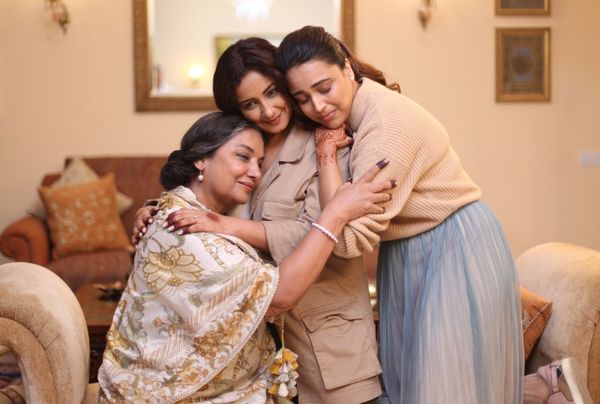Eye For Film >> Movies >> Sheer Qorma (2021) Film Review
Sheer Qorma
Reviewed by: Jennie Kermode

“Haven’t I given you a place at my table?” Ammi (Shabana Azmi) asks, low on patience with her non-binary child Saira (Divya Dutta) who has brought their wife Sitara (Swara Bhasker) along to iftar. And it’s true, she has – but if there were awards for passive aggression then she could compete at an international level.
Most of us will, at some time or other, have sat through dinners of this sort. The son of the household has brought along his new partner and Ammi couldn’t be happier, saying it with food, doing her best to foist more dishes on her at every opportunity. The other two dinner guests, she ignores. Both her son and his partner are uncomfortable with this and try to broaden the conversation so that everyone is included, but she does her utmost to resist. and she’s been playing this game for a lot longer than they have.
Whilst this isn’t the first Indian film to tackle homophobia – or even the first about Muslims – it breaks new ground in the way it develops these themes. Firstly, it is wholly sympathetic to its queer characters, and everyone except Ammi struggles to see what the fuss is about. Secondly, it isn’t interested in portraying monsters. Ammi’s suffering is just as clear as Saira’s. Writer/director Faraz Arif Ansari invites us to wonder if people in her position can change.
The setting and costumes may seem over the top to Western viewers, but are perfectly in keeping with an upper middle class Indian household in which everyone is trying to make a good impression. Likewise, the soapy aspects of the plot seem more natural in context and, importantly, will give it greater reach. There is no hint of soap opera about the performances. Azmi, in particular, shines, as Ammi struggles to reconcile her lingering love for her child with the dictates of her faith as she understand them.
The film itself does not position homosexuality or gender variance in opposition to Islam. We see Saira and Sitara earnestly praying, and contending that love is not a sin. Sitara’s position is complicated by memories of her own homophobic mother, who is now dead, so that rather than a polarisation of the issue we are invited to examine what a commitment to love means more generally, and how both sides need to reach out to resolve the situation. Screening at the Scottish Queer International Film Festival, t’s a tender exploration of a subject too often framed in anger, giving complex feelings room to breathe.
Reviewed on: 07 Oct 2021
















